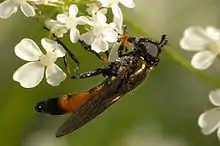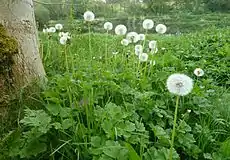Platycheirus granditarsus
Platycheirus granditarsus is a species of hoverfly. It is found in many parts of Britain and Europe. Typical habitat includes marshy meadows and ditches, where it can be found between May and October, though it is at its commonest between July and September. The most distinctive feature of this fly is the red-orange abdomen most easily seen as it takes off or alights.[1][2][3]
| Platycheirus granditarsus | |
|---|---|
 | |
| Scientific classification | |
| Kingdom: | |
| Phylum: | |
| Class: | |
| Order: | |
| Family: | |
| Genus: | |
| Subgenus: | |
| Species: | P. granditarsus |
| Binomial name | |
| Platycheirus granditarsus (Forster, 1771) | |
| Synonyms | |
Description
External images
For terms see Morphology of Diptera
Tergites 2-4 are largely red (hind corners of tergites 2 and 3 are black in females). Male metatarsus is dilated and with an inward protuberance. It has blackish wings.
See references for determination.[4][5][6][7]
Distribution
Palearctic: Fennoscandia south to France and the Alps, Ireland east through Northern Europe and Central Europe into European Russia then across Siberia and the Russian Far East to the Pacific coast. Nearctic: Alaska to Quebec and south to Colorado.[8][9][10]

Biology
Habitat: humid grassland subject to flooding, marsh, fen, edges of raised bogs. Flies May to September. [11] It flies May to August.
References
- Ball, S.G.; Morris, R.K.A. (2000). Provisional atlas of British hoverflies (Diptera, Syrphidae). Monks Wood, UK: Biological Record Centre. pp. 167 pages. ISBN 1-870393-54-6.
- Morris, Roger K.A. (1999). Hoverflies of Surrey. Surrey Wildlife Trust. p. 244. ISBN 0-9526065-3-4.
- Stubbs, Alan E. & Falk, Steven J. (1983). British Hoverflies: An Illustrated Identification Guide. British Entomological & Natural History Society. p. 253, xvpp.
- Van Veen, M. (2004). Hoverflies of Northwest Europe: identification keys to the Syrphidae. 256pp. KNNV Publishing, Utrecht.addendum.
- Van der Goot, V.S. (1981). De zweefvliegen van Noordwest - Europa en Europees Rusland, in het bijzonder van de Benelux. KNNV, Uitgave no. 32: 275pp. Amsterdam.
- Bei-Bienko, G.Y. & Steyskal, G.C. (1988). Keys to the Insects of the European Part of the USSR, Volume V: Diptera and Siphonaptera, Part I. Amerind Publishing Co., New Delhi. ISBN 81-205-0080-6.
- Coe, R.L. (1953). "Diptera: Syrphidae". Handbks. Ident. Br. Insects 10(1): 1-98. R. Ent. Soc. London. pdf.
- Fauna Europaea.
- Peck, L.V. (1988). "Syrphidae". In: Soos, A. & Papp, L. (eds.). Catalogue of Palaearctic Diptera 8: 11-230. Akad. Kiado, Budapest.
- Vockeroth, J.R. (1992). The Flower Flies of the Subfamily Syrphinae of Canada, Alaska, and Greenland (Diptera: Syrphidae). Part 18. The Insects and Arachnids of Canada. Ottawa, Ontario: Canadian Government Pub Centre. pp. 1–456. ISBN 0-660-13830-1.
- Speight, M.C.D. (2011). "Species accounts of European Syrphidae (Diptera)" (PDF). Syrph the Net, the database of European Syrphidae. 65: 285pp.